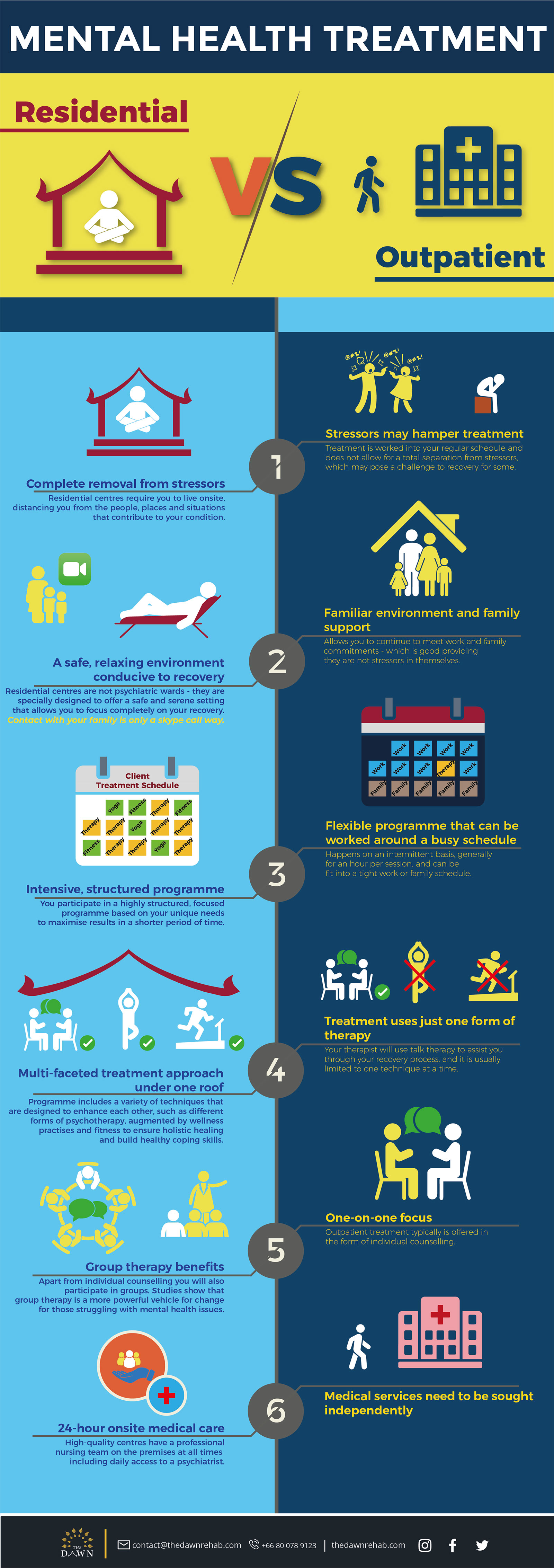Moving Toward Recovery: Inpatient Care and Outpatient Treatment at a Glance
When you’re struggling with a mental health issue, determining what will aid you in recovery is a critical decision. Modern mental health treatment generally focuses on two types of treatment: inpatient care, which is the most intensive level of care, and outpatient, which can be worked into a busy lifestyle. Key differences between these two types of treatment include:
The Care Environment
Long-term inpatient care offers the most intensive level of treatment and involves a structured, focused environment that is centred on developing specific skills needed to cope with your unique needs.
Furthermore, the treatment is held in-house in a facility, providing a trigger-free environment and the highest level of support and supervision from trained staff. Also, during your stay in a treatment facility, like The Dawn, for instance, you can access multiple on-site amenities and stay in luxurious accommodation.
Outpatient therapy, on the other hand, usually requires the person to undergo therapy and counselling sessions. These are typically held weekly or, depending on the intensity of one’s treatment, 3 to 5 times a week. The upside is that it’s possible to incorporate such sessions into your daily schedule. The downside is that you don’t have access to 24-hour support and are still surrounded by various triggers that may result in relapse.
Exposure to Stressors
The inpatient care environment includes a 24-hour safe and secure centre completely removed from potential stressors. People living at home and accessing outpatient therapy are bound to come into contact with the people, places or situations that cause them stress in their daily lives.
Types of Programmes Offered
Inpatient therapy includes diverse programming such as meditation, therapy, and wellness to treat all aspects of a mental health issue and promote healthy coping skills. Such programs are also heavily individualised, providing patients with a treatment program tailored to their specific requirements and instances.
At The Dawn, each of our patients undergoes a comprehensive pre-treatment assessment, based on which our team designs an all-around individual wellness plan. The exact recovery roadmap will depend on one’s situation and mental condition and will be based on our two-pillar approach, which includes:
- Western-based treatment:
Depending on your individual situation, you can undergo several types of therapy treatments, including Cognitive Behavioral Treatment (CBT), Tension and Trauma Releasing Exercise (TRE), Trauma Resiliency Model (TRM), or Eye Movement Desensitisation and Reprocessing (EMDR).
- Holistic treatment:
During your mental health retreat at The Dawn, you will undergo a comprehensive, holistic wellness program to support your well-being. This includes yoga sessions, massage therapy, physical exercise, mindfulness meditation, and art therapy.
Outpatient programs, on the other hand, typically involve talk therapy. The option of adding in other recovery techniques is the prerogative and responsibility of the individual and must be sourced through different providers.
Medical Care
Outpatient therapy may be better suited toward those experiencing mild symptoms, as there is no specialised access to medical treatment, while people struggling with sustained impacts to their physical or mental health often benefit from the safety, security and 24-hour access to medical care at an inpatient centre.
Is Long-Term Inpatient Care or Outpatient Treatment Right for Me?
Both inpatient and outpatient treatment programmes strive to promote wellness and a return to a positive mental and physical state. When determining which treatment type is better for you, consider the following factors:
- Severity and duration of symptoms:
Think about your condition – is it severe, has it tormented you for long, what impact does it have on your life? Inpatient programs provide a higher level of support and a stressor-free environment, perfect for treating and recovering from more severe mental issues.
- Work and family commitments:
While inpatient programs can be more efficient, they require you to stay in a facility for a specific period – usually 1 to 3 months. If you have professional and family commitments, outpatient programs might seem like a better option, allowing you to combine your daily activities with treatment.
- Sensitivity to potential stressors:
The major downside of outpatient treatment care is that you’re still exposed to various triggers and stressors. These can significantly hamper your treatment, preventing you from full recovery. If you’re sensitive to such stressors, an inpatient program will provide you with a peaceful and stress-free environment required for successful recovery.
- Cost considerations:
Inpatient treatment programs are typically more expensive than outpatient care. This is especially true for Western facilities, which charge dozens of thousands of dollars for undergoing a monthly inpatient treatment program. On the other hand, when choosing a wellness retreat abroad, for instance, in Thailand, you can get the same level of care for a much lower cost. You can still expect to pay more than for an outpatient program, though.
To summarise, there are many considerations to keep in mind when choosing between long-term inpatient care and outpatient programs. Analyse your situation thoroughly and look at the pros and cons of both options.
Mental Health Retreats are Growing in Popularity
Long-term inpatient treatment or mental health retreats offer the most intensive level of care and immediate removal from personal stressors – and are sought out by people who:
- Have tried seeing a therapist on an outpatient basis but continue to struggle with their mental health condition.
- Find that starting treatment in an inpatient environment and then following up with outpatient care is most effective in treating a mental health issue.
- Recognise the long-term implications of their mental health disorder and prefer to tackle the problem in the most effective way possible right from the start.
For this reason, many people opt for inpatient treatment as the first step and then take advantage of The Dawn’s Aftercare and perhaps outpatient care as well to support their recovery post-treatment. This way, they get the best of both worlds, increasing their chances of full recovery.
The Dawn: Long-Term Inpatient Care at its Finest

The Dawn Wellness Centre and Rehab in Thailand is a well-known, boutique mental health retreat in Thailand, offering residential care in a serene environment far away from stressors. Depending on the severity of your condition, our mental wellness programme can be tailored to last from two weeks to three months ideally and has been specially designed to help individuals struggling with a mental health condition to:
- Feel better almost immediately
- Gain a deeper understanding of their symptoms
- Learn skills to manage their condition
Reaching out for support is a brave first step in changing your life. If you are struggling with a mental health issue and are considering long-term inpatient treatment, please call us to see how The Dawn can assist you in achieving a new way to live.
Related Posts
 Inpatient vs Outpatient Rehab: The Ultimate Guide to Choosing the Right Treatment Option
When it comes to addiction treatment, there are realistically only two viable options that will give you a chance of success: inpatient and outpatient rehab. Attempting recovery alone almost never...
Inpatient vs Outpatient Rehab: The Ultimate Guide to Choosing the Right Treatment Option
When it comes to addiction treatment, there are realistically only two viable options that will give you a chance of success: inpatient and outpatient rehab. Attempting recovery alone almost never...
 The Cost of Addiction Treatment in Australia
Addiction is a complex illness that affects millions of people globally, including Australians. It can have devastating effects on individuals and their families, including physical, emotional, social, and financial consequences....
The Cost of Addiction Treatment in Australia
Addiction is a complex illness that affects millions of people globally, including Australians. It can have devastating effects on individuals and their families, including physical, emotional, social, and financial consequences....
 Inpatient Drug Rehab Centre: Pros & Cons and Why You Should Attend
A high quality drug rehabilitation centre in Thailand can play a crucial role in addiction recovery, as professional help is often a necessary step in turning your life around. By attending a...
Inpatient Drug Rehab Centre: Pros & Cons and Why You Should Attend
A high quality drug rehabilitation centre in Thailand can play a crucial role in addiction recovery, as professional help is often a necessary step in turning your life around. By attending a...
 Residential Addiction Treatment vs. Outpatient Counselling Which One is Right for You?
Once you have decided to get help for alcohol or drug addiction, the next choice you will have to make is between residential addiction treatment and outpatient counselling. Each kind of...
Residential Addiction Treatment vs. Outpatient Counselling Which One is Right for You?
Once you have decided to get help for alcohol or drug addiction, the next choice you will have to make is between residential addiction treatment and outpatient counselling. Each kind of...





